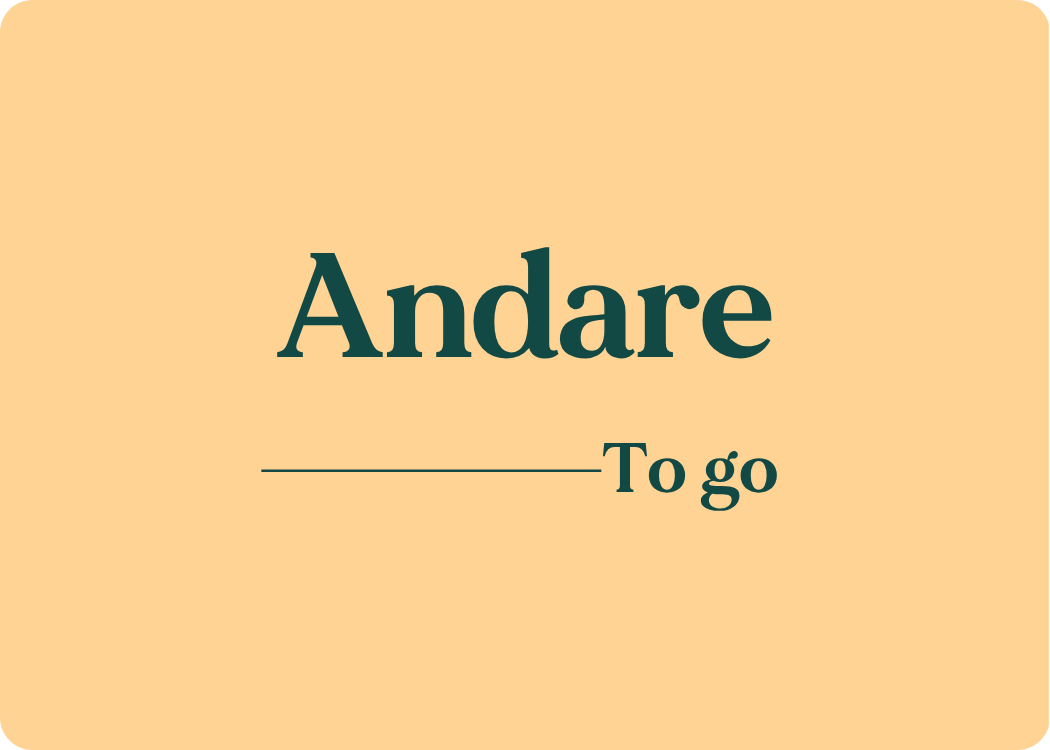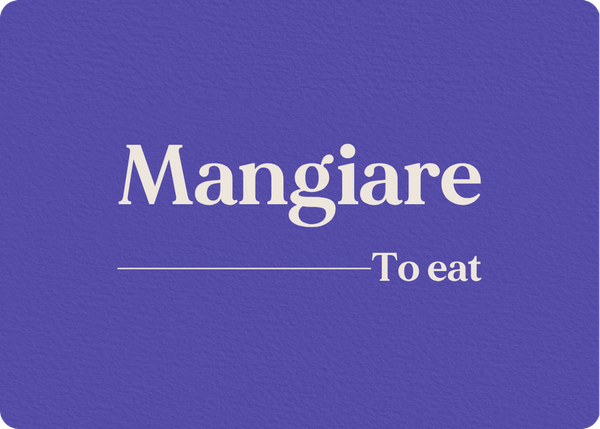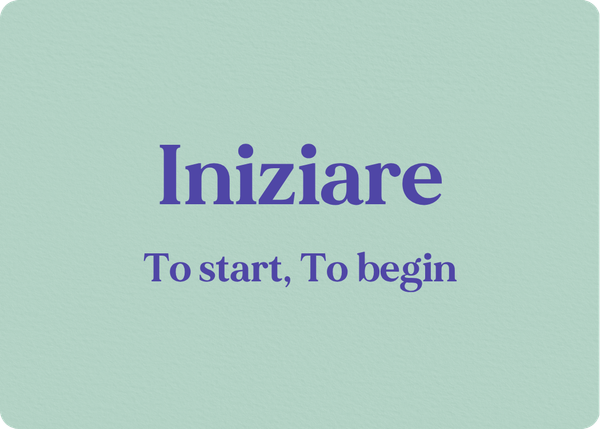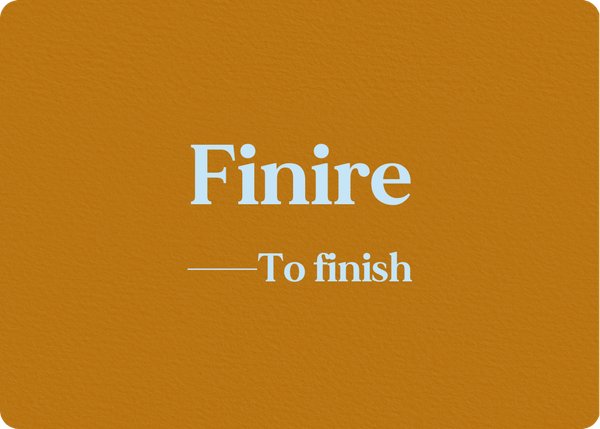What is Andare?
Andare is one of the most irregular and essential Italian verbs meaning "to go", "to travel", or "to move towards". It belongs to the first conjugation (-ARE verbs) but is highly irregular in many tenses. This fundamental verb is absolutely crucial for everyday Italian conversation and is one of the first verbs every Italian learner must master. Essential for expressing movement, future plans, and appearing in numerous idiomatic expressions.
Key Features of Andare:
- Type: Irregular first conjugation verb (-ARE)
- Meaning: To go, to travel, to move towards
- Irregularities: Present tense (vado, etc.), future (andrò), conditional (andrei), present subjunctive (vada, etc.), imperative (va'/vai, etc.)
- Auxiliary verb: Uses "essere" (to be) for conjugation in compound tenses
- Past participle: Andato
Indicativo – Indicative Mood
Presente (Present Tense)
| Person | Conjugation |
|---|---|
| io | vado |
| tu | vai |
| lui/lei | va |
| noi | andiamo |
| voi | andate |
| loro | vanno |
Example:
Vado in palestra tre volte a settimana.
I go to the gym three times a week.
Passato Prossimo (Present Perfect)
| Person | Conjugation |
|---|---|
| io | sono andato/a |
| tu | sei andato/a |
| lui/lei | è andato/a |
| noi | siamo andati/e |
| voi | siete andati/e |
| loro | sono andati/e |
Example:
Michele è andato in Irlanda l'anno scorso.
Michele went to Ireland last year.
Imperfetto (Imperfect)
| Person | Conjugation |
|---|---|
| io | andavo |
| tu | andavi |
| lui/lei | andava |
| noi | andavamo |
| voi | andavate |
| loro | andavano |
Example:
Da bambini andavamo al mare ogni estate.
As children, we used to go to the sea every summer.
Trapassato Prossimo (Past Perfect)
| Person | Conjugation |
|---|---|
| io | ero andato/a |
| tu | eri andato/a |
| lui/lei | era andato/a |
| noi | eravamo andati/e |
| voi | eravate andati/e |
| loro | erano andati/e |
Example:
Quando mi ha chiamato il direttore, ero appena andato via dall'ufficio.
When the director called me, I had just left the office.
Passato Remoto (Simple Past)
| Person | Conjugation |
|---|---|
| io | andai |
| tu | andasti |
| lui/lei | andò |
| noi | andammo |
| voi | andaste |
| loro | andarono |
Example:
Dante andò in esilio nel 1302.
Dante went into exile in 1302.
Trapassato Remoto (Past Anterior)
| Person | Conjugation |
|---|---|
| io | fui andato/a |
| tu | fosti andato/a |
| lui/lei | fu andato/a |
| noi | fummo andati/e |
| voi | foste andati/e |
| loro | furono andati/e |
Example:
Dopo che fu andata dal medico, si sentì più tranquilla.
After she had gone to the doctor, she felt calmer.
Futuro Semplice (Simple Future)
| Person | Conjugation |
|---|---|
| io | andrò |
| tu | andrai |
| lui/lei | andrà |
| noi | andremo |
| voi | andrete |
| loro | andranno |
Example:
Il prossimo inverno andremo in montagna.
Next winter we will go to the mountains.
Futuro Anteriore (Future Perfect)
| Person | Conjugation |
|---|---|
| io | sarò andato/a |
| tu | sarai andato/a |
| lui/lei | sarà andato/a |
| noi | saremo andati/e |
| voi | sarete andati/e |
| loro | saranno andati/e |
Example:
Quando tornerai a casa, io sarò già andata via.
When you come back home, I will have already gone away.
Congiuntivo – Subjunctive Mood
Presente (Present Subjunctive)
| Person | Conjugation |
|---|---|
| che io | vada |
| che tu | vada |
| che lui/lei | vada |
| che noi | andiamo |
| che voi | andiate |
| che loro | vadano |
Example:
Spero che vadano a trovare i loro genitori più spesso.
I hope that they go to visit their parents more often.
Passato (Past Subjunctive)
| Person | Conjugation |
|---|---|
| che io | sia andato/a |
| che tu | sia andato/a |
| che lui/lei | sia andato/a |
| che noi | siamo andati/e |
| che voi | siate andati/e |
| che loro | siano andati/e |
Example:
Credo che Sara sia andata al cinema con Alessio.
I think that Sara has gone to the cinema with Alessio.
Imperfetto (Imperfect Subjunctive)
| Person | Conjugation |
|---|---|
| che io | andassi |
| che tu | andassi |
| che lui/lei | andasse |
| che noi | andassimo |
| che voi | andaste |
| che loro | andassero |
Example:
Se tu andassi a letto presto, saresti più riposato.
If you went to bed early, you would be more rested.
Trapassato (Past Perfect Subjunctive)
| Person | Conjugation |
|---|---|
| che io | fossi andato/a |
| che tu | fossi andato/a |
| che lui/lei | fosse andato/a |
| che noi | fossimo andati/e |
| che voi | foste andati/e |
| che loro | fossero andati/e |
Example:
Se foste andati in quel ristorante, avreste mangiato benissimo.
If you had gone to that restaurant, you would have eaten very well.
Condizionale – Conditional Mood
Presente (Present Conditional)
| Person | Conjugation |
|---|---|
| io | andrei |
| tu | andresti |
| lui/lei | andrebbe |
| noi | andremmo |
| voi | andreste |
| loro | andrebbero |
Example:
Giuliano andrebbe volentieri in vacanza.
Giuliano would go on vacation gladly.
Passato (Past Conditional)
| Person | Conjugation |
|---|---|
| io | sarei andato/a |
| tu | saresti andato/a |
| lui/lei | sarebbe andato/a |
| noi | saremmo andati/e |
| voi | sareste andati/e |
| loro | sarebbero andati/e |
Example:
Sarei andato al concerto, se avessi trovato i biglietti!
I would have gone to the concert, if I had found the tickets!
Imperativo (Imperative)
| Person | Conjugation |
|---|---|
| (tu) | va'/vai |
| (lui/lei) | vada |
| (noi) | andiamo |
| (voi) | andate |
| (loro) | vadano |
Example:
Va' subito a casa!
Go home right now!
Indefinite Moods
Infinito (Infinitive)
- Presente (Present): andare (to go)
- Passato (Past): essere andato/a (to have gone)
Examples:
Non è facile andare d’accordo con tutti.
It’s not easy to get along with everyone.
È stato utile essere andato alla riunione ieri.
It was useful to have gone to the meeting yesterday.
Participio (Participle)
- Presente (Present): andante (going) - mainly used as adjective or noun
- Passato (Past): andato (gone)
Examples:
Il pianista ha suonato l'andante in modo impeccabile.
The pianist played the andante impeccably.
Lidia è andata al mercato questa mattina.
Lidia went to the market this morning.
Gerundio (Gerund)
- Presente (Present): andando (going)
- Passato (Past): essendo andato/a (having gone)
Examples:
Andando a lavoro, ho incontrato un vecchio amico.
While going to work, I met an old friend.
Essendo andati in macchina, siamo arrivati molto prima.
Having gone by car, we arrived much earlier.
The verb Andare at a glance: Key tenses you need
| Present | Present Perfect | Imperfect | Present Subjunctive | Imperfect Subjunctive | Present Conditional |
|---|---|---|---|---|---|
| io vado | io sono andato/a | io andavo | che io vada | che io andassi | io andrei |
| tu vai | tu sei andato/a | tu andavi | che tu vada | che tu andassi | tu andresti |
| lui/lei va | lui/lei è andato/a | lui/lei andava | che lui/lei vada | che lui/lei andasse | lui/lei andrebbe |
| noi andiamo | noi siamo andati/e | noi andavamo | che noi andiamo | che noi andassimo | noi andremmo |
| voi andate | voi siete andati/e | voi andavate | che voi andiate | che voi andaste | voi andreste |
| loro vanno | loro sono andati/e | loro andavano | che loro vadano | che loro andassero | loro andrebbero |
Conclusion
Mastering the conjugation of "andare" is absolutely essential for speaking Italian, as it's one of the most frequently used verbs in the language. This highly irregular verb requires memorization of its unique forms, especially in the present tense (vado, vai, va, andiamo, andate, vanno) and future/conditional stems (andr-).
Remember the key points:
- Uses "essere" as auxiliary verb
- Past participle is "andato"
- Irregular in present tense, future, subjunctive, imperative, and past participle
- Essential for describing movement, travel, departure, and general motion or direction
- Featured in countless idiomatic expressions about going and movement
Keep practicing with real sentences and soon you'll master this fundamental Italian verb!





